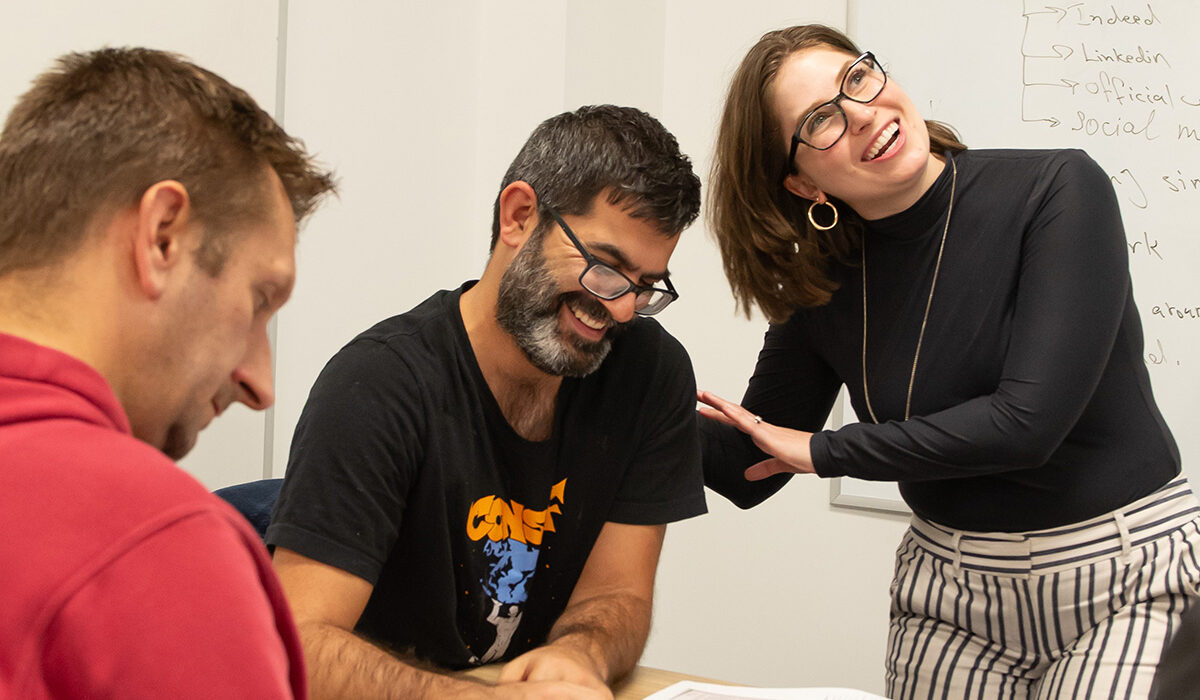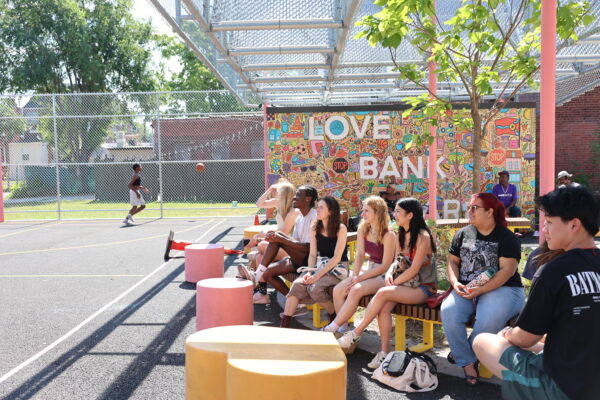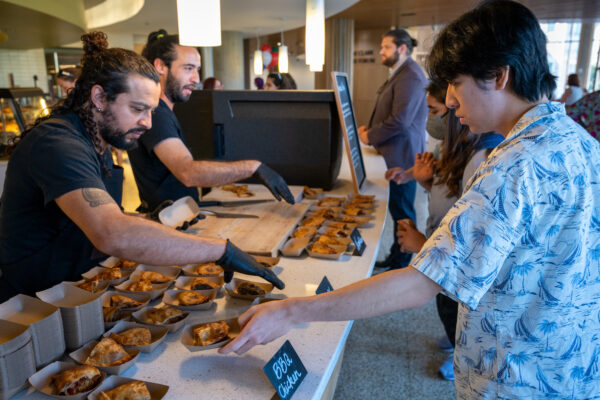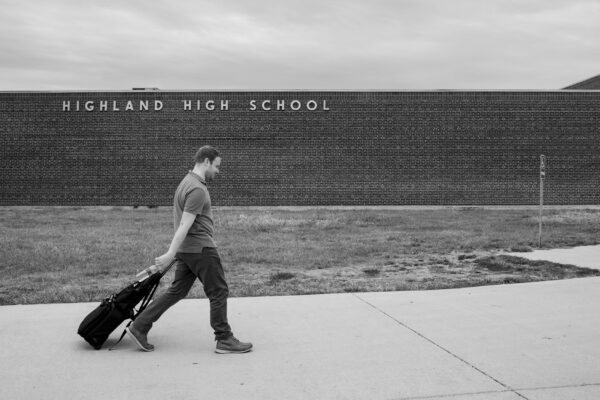Before they were refugees in St. Louis, they were economists, accountants, pharmacists, engineers, intelligence analysts, nurses and small business owners.
Then tragedy struck.
For many, the tragedy was a war (Ukraine, Bosnia); for some, it was the return of a repressive regime (Afghanistan). And for others, tragedy presented as a natural disaster (Turkey, Haiti), civil conflict (Syria, Sudan, Democratic Republic of Congo) or economic collapse (Venezuela).
Whatever the reason, they are here now, starting anew in St. Louis.
“Everyone here has a different story, but we are all here looking for better opportunity and to be a beneficial person to society,” said Enis Gokgoz, a refugee from Turkey who has an advanced degree in pedagogy and now is a teacher at Gateway Science Academy Middle School.
That quest has led Gokgoz and 68 refugees from 13 countries around the globe to Empower, the first no-cost program of its kind designed specifically for educated refugees. Launched in May by the School of Continuing & Professional Studies (CAPS) at Washington University in St. Louis, the 26-week program gives students the next-level English and professional skills they need to find jobs that match their talents and training. It also provides career coaching and an opportunity to earn a CAPS certificate in health care, data analytics, project management and other high-demand fields at no cost.
A grant from the Missouri Office of Refugee Administration is funding the program’s rollout. After that, WashU will assume all costs thanks to a $10 million donation from a university donor. The program graduates its first cohort of 25 students in December.
“It’s amazing what these students have accomplished in 26 weeks,” said Katie Blackburn Brown, director of the CAPS English Language Programs and the creator of Empower. “Many of our students are working long hours at multiple jobs; many of our students are experiencing trauma. But they have come together to build this supportive community and to do the hard work.”
When we welcome internationals, the entire St. Louis region becomes more vibrant and prosperous.
Susan Gobbo
In fiscal year 2024, the U.S. welcomed about 125,000 refugees, more than any year since 1996. Almost 3,300 of those refugees, many with college degrees, have settled in the state, largely in the St. Louis and Kansas City regions, according to the Missouri Office of Refugee Administration. They are, by law, allowed to work. But other obstacles — lack of English language skills, unfamiliarity with U.S. work culture, difficulty transferring credentials — stand between educated refugees and good jobs.
The phenomenon is called brain waste and it costs the entire St. Louis region, said Susan Gobbo, founder of two nonprofits that support international women and a consultant for the St. Louis Mosaic Project, a regional effort to boost St. Louis growth through immigration.
“Immigrants and refugees bring a lot to the region. Tax dollars, yes. They also open businesses and create jobs,” Gobbo said. “But the other thing that I hear from employers is that internationals bring innovation and new ways of thinking. When we welcome internationals, the entire St. Louis region becomes more vibrant and prosperous.”
Gobbo said that WashU, with its trusted reputation among local employers and long history educating of adult learners and international students, was uniquely positioned to pave professional pathways.
“I’ve worked with people who could not find a position because they couldn’t succeed in the job interview,” Gobbo said. “The Empower curriculum teaches students important professional skills and soft skills. I might know how to be a doctor in Brazil, but that doesn’t mean that I know how to be a doctor in America. The skills may be the same, but the American way of working is different.”
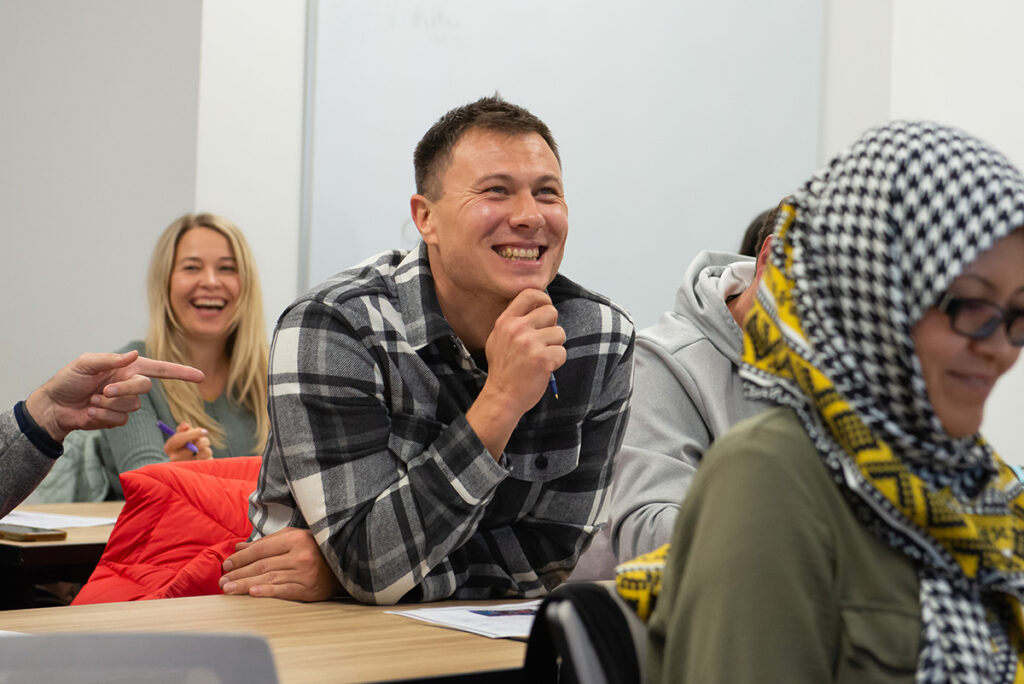
Improving English skills, introducing American work culture
Empower students take two classes a week at the Delmar Divine, home to a growing number of health, education and human service organizations. For tonight’s class, teacher Morgan Griffith has prepared a lesson on group work. Previously, student Oleksii Povazhnyi had told the class about a frustrating experience in another class where he did much of the work.
“It’s a classic story,” Morgan told the class. “Group work in the U.S. is extremely common. And it can be difficult to manage.”
Griffith goes on to provide strategies to students for group work, pausing to write down English vocabulary and phrases like “two heads are better than one” and “too many cooks in the kitchen.” She then reviews a prior lesson about communication in the American workplace.
“Remember when we talked about disagreeing? We say, ‘Oh, that’s so interesting. I agree with you about this …”
In unison, the class chimes in, “But …”
“That’s right. ‘But maybe we should think about this; but maybe we should consider that,’” Griffith continued. “That’s our indirect nature,” Griffith said. “Even in this classroom — we’re multicultural, we all have different communication styles. Keep that in mind. To an American’s ear, if you’re too direct, you might become that super annoying Ukrainian guy.”
She looks straight at Povazhnyi and the class cracks up. Laughter is common in this classroom to the delight and, quite frankly, the surprise of Brown.
“At first, some of the men would snap at each other,” Brown recalled. “That’s to be expected; there are ethnic and cultural differences. But you walk into class now and you can see how they want to help each other, how much fun they have together.”
Griffith is a big reason why. She keeps the energy high and coaxes every student, even those with lagging English skills, into contributing. Not long ago, Griffith dreamed of being an opera singer, but switched careers after reading a book about language acquisition.
“It was a revelation. I was like, ‘You mean, I can do this with my life?’” Griffith recalled.
She earned a graduate degree in TESOL (teaching English to speakers of other languages) at the University of Pennsylvania and got a job in New York. Then her husband, Paolo Scartoni, accepted a job at WashU as a lecturer in Romance languages and literatures in Arts & Sciences.
“I was a bit panicked but I was doing work that I was good at and that I really loved. There are not many opportunities to teach adults,” Griffith said. “So I couldn’t believe my luck when I met Katie. This program is so wonderful. And these students are so wonderful.”
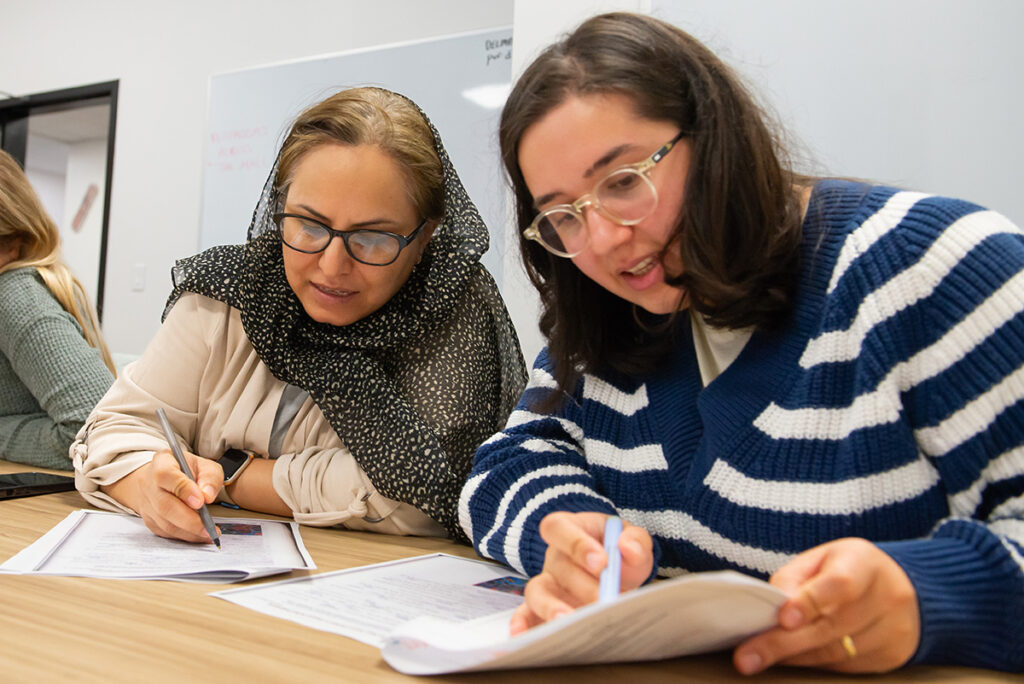
After a break, Griffith splits the class into teams to start their own make-believe group project. Dmytro Zribniak, a pharmacist from Ukraine, and Zahra Mosawi, a journalist from Afghanistan, decide to plan an international festival and start discussing their budget and timeline. Both had successful careers in their home countries and are determined to succeed here.
Zribniak has two advanced degrees and wants to be a pharmacist here, but first must be licensed in Missouri, a doable but lengthy process. His wife, Iryna, and daughter, Diana, are also enrolled in Empower. Iryna also is a pharmacist who now works as a home health-care worker. Diana graduated from medical school in Ukraine and wants to be a pediatrician.
Mosawi, in contrast, wants to start a new career in business. In Afghanistan, she reported on women’s rights, ultimately serving as director of a magazine published by the now-disbanded Afghan Ministry of Women’s Affairs. Today, women in Afghanistan are not permitted to speak in public or attend a university, much less work as journalists.
“They want women to just be home and be a mother and a wife. They don’t want a woman to be something different,” Mosawi said. “For a time, we changed these perspectives. We had women who worked for women’s rights. The Taliban came back to power and changed everything.”
Doing what WashU does best
Brown has been working with immigrants and refugees for more than two decades. As a graduate student at the University of Illinois, she taught English to international students as well as Congolese refugees and Spanish speakers in the local jail. From there, she went to work at City Colleges of Chicago, where she developed curricula and assessments to measure growth for the system’s 45,000 adult education and English-language students.
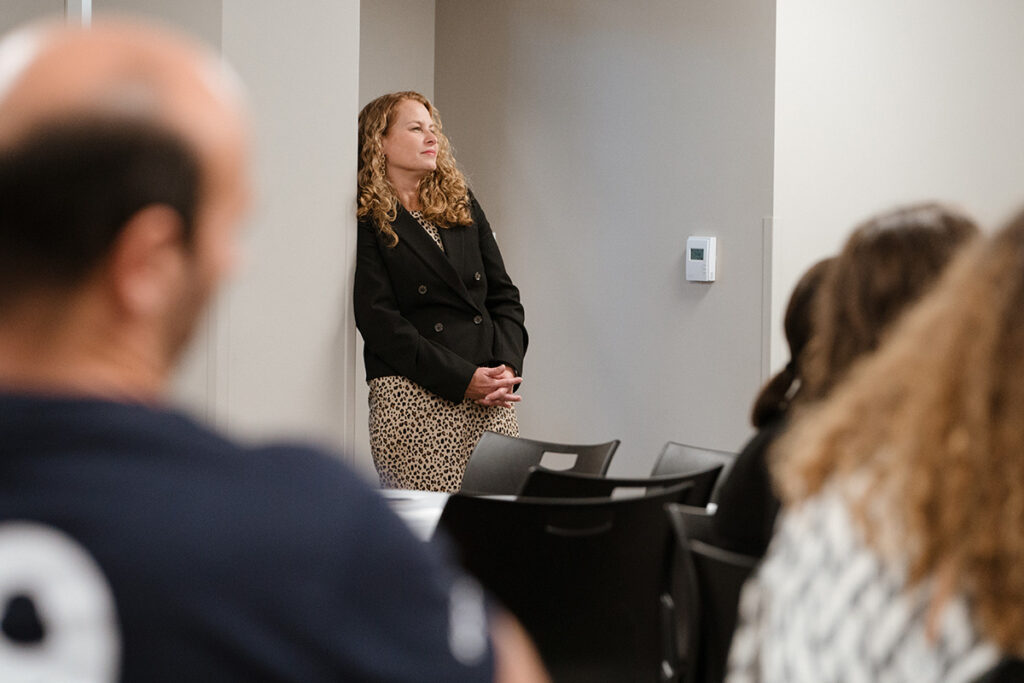
“The norm had always been basic entry-level workforce skills and conversational skills — how to get a driver’s license, how to manage your banking, basically how to be a productive member of society,” Brown said. “There was this idea that they don’t need anything more than that. But I could see that this population could move into our for-credit programming if only they had more English.”
Fast forward to 2021. Brown was now at WashU, teaching English to scholars at the McKelvey School of Engineering and the Brown School as well as CAPS, then known as University College. In 2022, a donor came forward with money to support immigrant and refugee education. CAPS Dean Sean Armstrong asked Brown to propose a plan that would address brain waste without duplicating the great work of existing community programs. Since his arrival in 2021, Armstrong has launched and strengthened degree and certificate programs that meet the needs of the regional job market.
Brown first looked to WashU’s peers but could not find any successful models. Many European universities, however, have helped successfully integrate educated refugees into the economy. So Brown applied for, and won, a WashU Libraries Newman Exploration Travel Fund award to travel to France, England, Belgium and Germany to meet with educators. She came back with a vision: WashU would do what WashU does best — serve hard-working, high-achieving students through rigorous coursework and comprehensive services and support.
“And we would do it in an environment that was collaborative and compassionate,” Brown said.
Early results are promising. All of the graduating Empower students have improved their language scores. In total, roughly 30 Empower students are enrolled and will enroll next semester in CAPS certificate programs.
And yet, there have been challenges. The ongoing effects of trauma have hindered some students’ ability to focus, manage stress and make decisions. Another hard fact: Life as a refugee is exhausting — caring for family, working multiple jobs, negotiating a new culture. Empower students said that, for the most part, St. Louisans have welcomed them. But that hasn’t made life any easier.
‘So many times we think, “Oh, how lucky you are to be in America.” And they will say, “Yes, I am lucky that I am safe. But it’s not really luck because I struggle, my whole family is not here, my country is going through this awful thing.” It’s complicated.’
Katie Blackburn Brown
“It’s all of the things,” Brown said. “It’s hard for many of our Afghan women because of the large cultural differences. Even our Ukrainian students, where the cultural differences are not as great, struggle. During the student presentations, a Ukrainian student told us how he and his family had to sleep in a subway station for two weeks when the Russian bombing started; an Afghan woman talked about being targeted by the Taliban. Their resilience is awe inspiring, but you can’t deny that those experiences affect people.
“So many times we think, ‘Oh, how lucky you are to be in America.’ And they will say, ‘Yes, I am lucky that I am safe. But it’s not really luck because I struggle, my whole family is not here, my country is going through this awful thing. It’s complicated.’”
To better serve students, the Empower team is undergoing training in trauma-informed teaching practices and is partnering with the Brown School to provide more support and resources to students. Brown also is rethinking the pace of coursework, and CAPS has established a college transition course to help certificate students.
“We don’t want to push students to do something they don’t want to do and have them feel that there is one chance,” Brown said. “But we also don’t want students to feel like they can’t, or they’re not able to, be successful.”
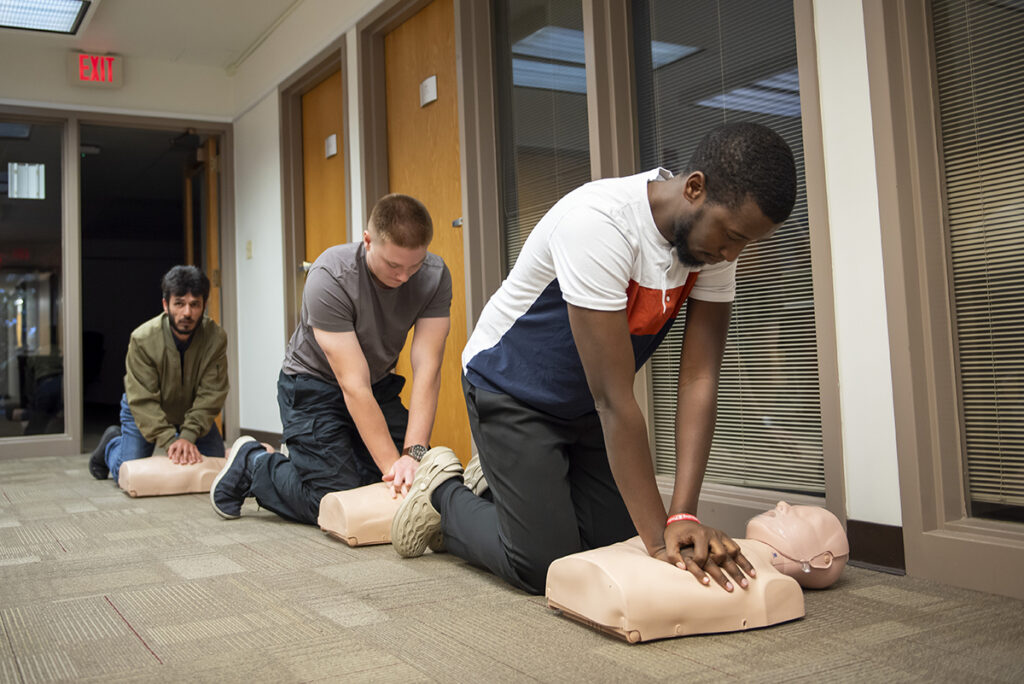
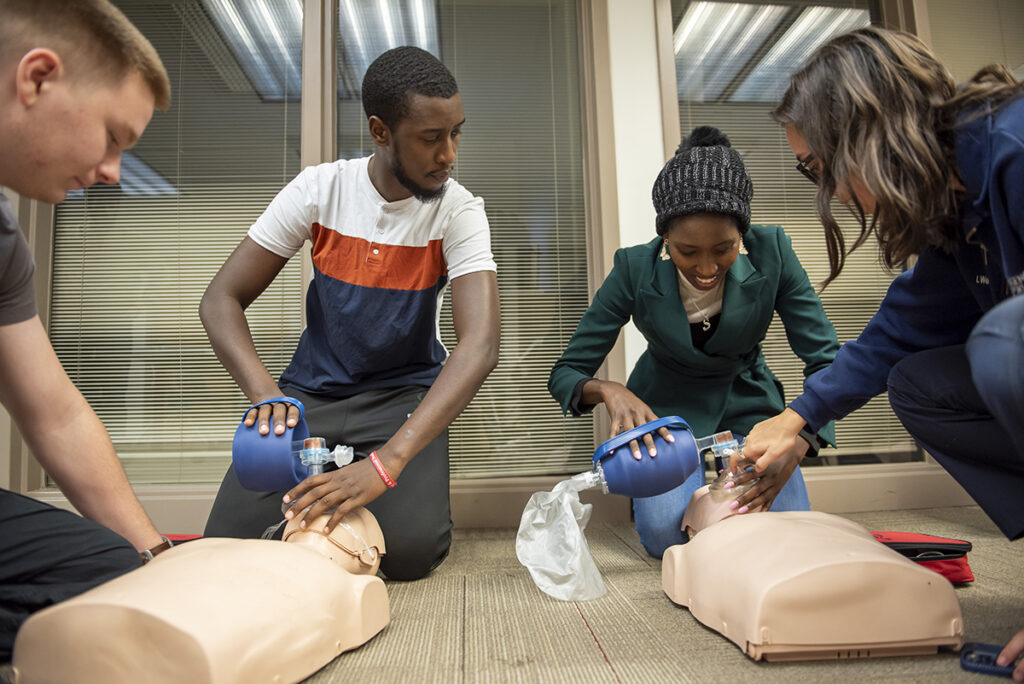
Supporting students inside, outside of the classroom
Olivier Murwanashaka, a refugee from the Democratic Republic of Congo, exemplifies the program’s promise. He was initially rejected because he lacked the requisite English skills. But when he showed up for class in a freshly pressed shirt, Andre Mayers, Empower’s student success navigator, couldn’t turn him away.
Before arriving in St. Louis, Murwanashaka lived in a refugee camp in Uganda. In Congo, members of his tribe, the Banyamulenge, are systematically slaughtered by tribal militias. And in 2017, marauders attacked his village.
“They burned the house. They took all cow,” Murwanashaka said.
In 2023, Murwanashaka and his siblings came to St. Louis where their eldest brother, Justin B. Serugo, had worked his way up from a hotel housekeeper to a research technician for Jeffrey I. Gordon, MD, director of the Edison Family Center for Genome Sciences & Systems Biology at WashU Medicine. A year after they arrived, Serugo died of liver cancer. He was 44.
Murwanashaka, 32, was devastated, but determined. When he first entered the program, Murwanashaka did not know how to use the free Chromebook provided to students. So he completed every assignment by hand and submitted a photo of his work. But after attending office hours with Mayers, he mastered the technology and soon became his classmates’ go-to tutor.
Mayers hired Murwanashaka as a teaching assistant for the second Empower cohort, which includes his younger sister, Esperance Kaje. Mayers also arranged for Murwanashaka, who aspires to be a mental health counselor, and other students pursuing jobs in health care to receive free Basic Life Support/CPR training through WashU’s Emergency Support Team.
“We know that having WashU on your resume will get you a second look. And we know that skills like CPR training are requirements for jobs in health-care and child-care settings,” Mayers said. “So a big part of what we do is find ways to support students outside of the classroom.”
Recently, the Empower staff helped another DRC refugee find a job with daytime hours so he can attend class at night; identified good training programs for an Afghan student who wants to be a dental hygienist; helped a Ukrainian student find a new place to live; and hired and promoted the catering business of a Venezuelan student who makes delicious churros. The list goes on and on.
“I wish the world could see their promise,” Brown said. “They are generous; they are caring. If we welcome them and help them get jobs and careers, they are going to stay here and make our St. Louis community better.”
